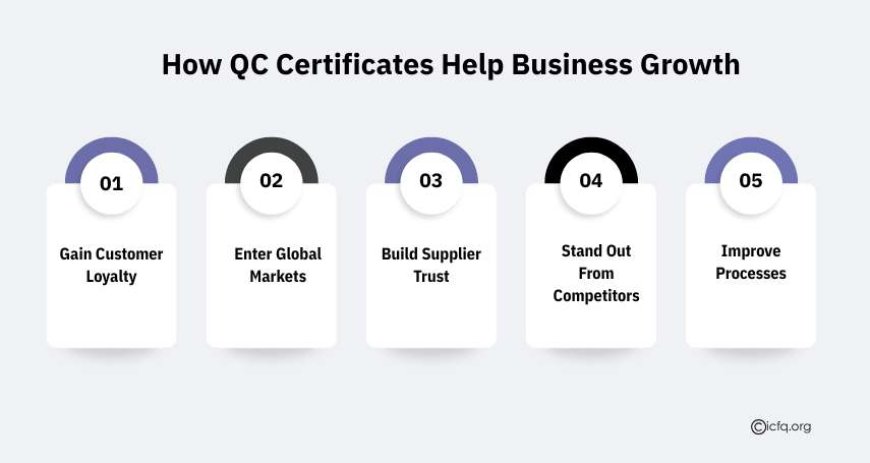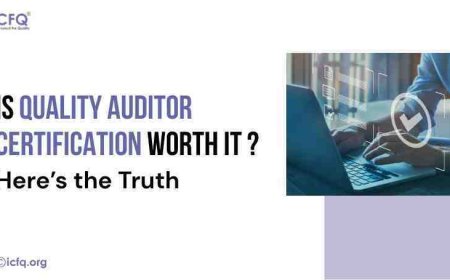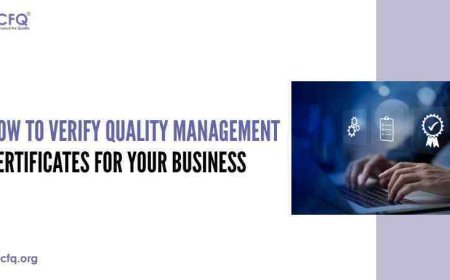Why Quality Control Certificates Matter in Top Business Sectors
Learn why QC certificates are important for businesses. Ensure product quality, compliance, and trust across industries with proper certification.

Have you ever bought a product and wondered if it was really safe?
Or used a service and hoped it worked correctly? These questions are very common. People want quality, safety, and reliability in everything they use.
This is where Quality Control Certificates (QC certificates) come into the picture. A QC certificate is a document that shows a product, service, or process meets certain quality standards. It is proof that a company cares about its customers, safety, and reliability.
QC certificates are important not just for customers but also for businesses. They help companies stay competitive, reduce mistakes, follow rules, and grow steadily. In today’s world, customers, suppliers, and regulators all trust companies more if they have QC certificates.
QC certificates are important. They help businesses and all kinds of companies do better and stay safe.
What Is a QC Certificate?
A QC certificate is a paper or digital document that proves a product, service, or process meets specific quality rules.
It is usually issued by:
-
Government authorities
-
Independent organizations
-
Accredited third-party auditors
QC certificates are different from internal checks. When a company checks its own products, it may not be enough. A QC certificate is recognized by everyone customers, business partners, and regulators. It shows that a company follows proper procedures, produces safe products, and meets industry standards.
In simple words, a QC certificate is a trust mark. It says: “We checked our product carefully, and it is safe and reliable.”
Why QC Certificates Are Important
1. Build Customer Trust
Customers want products and services that are safe and reliable. They are more likely to buy from a company that has a QC certificate.
A QC certificate shows:
-
The product is safe to use
-
The quality is checked regularly
-
The company follows rules
For example, if you buy packaged food, you feel safer if it has a QC certificate. You know it is tested and safe to eat. Similarly, in electronics, a QC certificate ensures that the device works properly and will last longer.
2. Follow Laws and Regulations
Many industries have strict rules. Healthcare, food, automotive, and construction are some examples.
QC certificates help companies:
-
Follow government rules
-
Avoid fines and penalties
-
Pass inspections easily
-
Keep their license to operate
Without QC certificates, companies can face legal problems. This can damage their reputation and cause loss of money. A certificate ensures companies follow laws properly.
3. Reduce Mistakes and Costs
QC certificates also help companies reduce mistakes. Following quality rules means:
-
Products have fewer defects
-
Less money is wasted on rework or scrap
-
Customer complaints go down
-
Returns and refunds are reduced
For example, in a manufacturing unit, a QC certificate ensures machines are working properly, and raw materials are of good quality. This reduces defective products and saves money.
4. Compete Better in the Market
QC certificates give companies an edge in the market. They help:
-
Gain new customers
-
Win supplier trust
-
Enter international markets
-
Win contracts and tenders
Many buyers now prefer to work only with certified companies. Without a QC certificate, businesses may lose opportunities. Companies with certificates look professional, reliable, and safe.
5. Reduce Risks
QC certificates help companies identify and prevent problems early.
They can prevent:
-
Product defects
-
Safety issues
-
Customer complaints
-
Legal or financial risks
For example, a food company with a QC certificate will regularly check ingredients and production. This reduces the chance of contamination and protects the company from lawsuits.
Importance of QC Certificates in Different Industries
1. Manufacturing
Manufacturing involves making products that need to be safe, reliable, and high-quality.
QC certificates help manufacturers:
-
Standardize production processes
-
Reduce defects
-
Ensure supply chain safety
-
Meet global export requirements
Examples of common certifications are ISO 9001 and CE marking. A factory with these certificates can sell products in other countries confidently.
2. Food and Beverage
Food safety is very important. QC certificates in food and beverage help companies:
-
Ensure food is safe to eat
-
Check ingredient quality
-
Reduce contamination risk
-
Follow food safety laws
Common certificates include FSSAI, HACCP, and GMP. Customers feel safer buying products with these certificates. It also helps companies sell food in different markets legally.
3. Healthcare and Pharmaceuticals
In healthcare, mistakes can be dangerous. QC certificates ensure:
-
Medicines are safe and effective
-
Medical devices work correctly
-
Production is clean and sterile
-
Documentation is accurate
Certifications like WHO-GMP, ISO 13485, and FDA approvals are very important. They help companies make safe products and build trust with patients and hospitals.
4. Construction and Infrastructure
Construction projects need safe and strong materials. QC certificates ensure:
-
Buildings are safe and durable
-
Materials meet quality standards
-
Work follows rules and codes
-
Projects pass inspections
Many government and private projects require QC certificates to approve contractors. Without these certificates, a company may not be allowed to work on large projects.
5. Automotive
Cars and vehicles must be safe, durable, and high-quality.
QC certificates help automotive companies:
-
Reduce defects and recalls
-
Meet safety standards
-
Improve product performance
-
Comply with international rules
ISO/TS 16949 is widely used in the automotive industry. A car manufacturer with this certificate is trusted more by customers and partners.
6. IT and Software
Even software and digital services need QC certificates. They help companies:
-
Provide reliable services
-
Protect customer data
-
Reduce software bugs and errors
-
Improve user experience
Certificates like ISO/IEC 27001 (for data security) and ISO/IEC 20000 (for IT services) are common in IT companies. They show the company follows strict quality and security rules.
7. Retail and E-commerce
Retail and online businesses also need QC certificates. They help:
-
Verify supplier authenticity
-
Reduce fake or poor-quality products
-
Maintain customer trust
-
Standardize products across regions
Many e-commerce platforms require suppliers to provide QC certificates before selling products online. Customers trust certified products more.
Common QC Certificates Across Industries
General Standards:
-
ISO 9001 – Quality Management
-
ISO 14001 – Environmental Management
-
ISO 45001 – Workplace Safety
-
ISO 27001 – Data Security
Industry-Specific Certificates:
-
FSSAI, HACCP, GMP – Food and Pharma
-
CE Marking – Europe
-
ROHS – Electronics
-
TS 16949 – Automotive
-
BIS – India product standards
Choosing the right QC certificate ensures safety, trust, and compliance.
How QC Certificates Help Business Growth

-
Gain Customer Loyalty: Customers buy again when they trust the brand.
-
Enter Global Markets: Many countries only accept certified products.
-
Build Supplier Trust: Partners prefer certified businesses.
-
Stand Out From Competitors: Certification makes a brand different.
-
Improve Processes: Regular audits help companies improve efficiency.
QC certificates are not just papers- they help companies grow, reduce risks, and stay competitive in the long run.
The Real Value of QC Certificates for Businesses
A QC certificate is more than a paper. It is proof that a product, service, or process is safe, reliable, and high-quality.
Across industries from manufacturing to food, healthcare to automotive, IT to retail, QC certificates:
-
Build customer trust
-
Reduce mistakes and costs
-
Ensure compliance with laws
-
Help companies grow and expand
-
Protect brand reputation
Businesses that ignore QC certificates risk losing customers, money, and opportunities.
Investing in QC certificates is investing in reliability, safety, and long-term success. Companies that care about quality and growth always keep them.





























